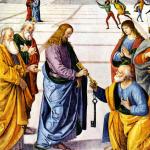 In the icon of St Sisoes, the saint is looking down upon the bones of Alexander the Great. In it we are shown that even the one who built such a great empire, with its great wealth, Alexander, the greatest of the conquerors, could not overcome death. His fate is the fate of us all. No matter how great we are in this life, our life will come to an end. This is expressed through the words on the icon, where St Sisoes is showing to be saying, “The mere sight of you, tomb, dismays me and causes my heart to shed tears, as I contemplate the debt we, all men, owe. How can I possibly stand it? Oh, death! Who can evade you?”
In the icon of St Sisoes, the saint is looking down upon the bones of Alexander the Great. In it we are shown that even the one who built such a great empire, with its great wealth, Alexander, the greatest of the conquerors, could not overcome death. His fate is the fate of us all. No matter how great we are in this life, our life will come to an end. This is expressed through the words on the icon, where St Sisoes is showing to be saying, “The mere sight of you, tomb, dismays me and causes my heart to shed tears, as I contemplate the debt we, all men, owe. How can I possibly stand it? Oh, death! Who can evade you?”
The icon does not depict any known historical event in the life of St Sisoes; the monk is said to have lived on St. Antony’s Mountain for over seventy years, arriving there around the year 357. Saracens were said to have sacked the grounds, leaving it entirely deserted before St Sisoes made his way there and turned it into his home. Nonetheless, the icon depicts his monastic legacy, and uses it to criticize all the kingdoms of the world. It was written around the time of the Fall of Constantinople and became a popular reminder of how nothing, not even Christian kingdoms, can withstand the ravages of time. As the Preacher is wont to tell us, there is a time for everything, including the end of earthly kingdoms. “For everything there is a season, and a time for every matter under heaven: a time to be born, and a time to die…” (Ecclesiastes 3:1-2a RSV).
We all must come to terms with our death. Plato told us that the one who loves wisdom knows that their life is a preparation for death. How, exactly, do we make such preparations? Do we live for the glory the nation-state, taking exaggerated pride in its greatness, seeking to prop it and secure its way of being up above everything else? Do we live for the moment, to pursue our own pleasures in this world, and the riches we need in order to achieve them? Or do we live for Christ, and follow Christ’s rule for us? To live for Christ is to die to the self. To live for Christ is to love our neighbor, to do good for our neighbor, to seek their well-being, whether or not they are from our nation-state. Our neighbor is to be one with us in Christ. “There is neither Jew nor Greek, there is neither slave nor free, there is neither male nor female; for you are all one in Christ Jesus” (Galatians 3:28 RSV). The Christian is not going to “look out for number one” or “look out for our land above all else.” The Christian, the one who has died to themselves and put on Christ, is going to live for others, to be in a life of service for others, seeking to work for their benefit no matter who they are and where they come from. This must be our focus as we contemplate our death.
How we meet that death, how we meet Christ in our death, will come out of how we have met Christ in our life — that is, how we have treated the widows, the orphans, the poor, the strangers, and anyone else who has a need we can fulfill. Thus, St. Antony the Great tells us that what unites our life with our death is our relationship with our neighbor. “He [St. Anthony] also said, ‘Our life and our death is with our neighbour. If we gain our brother, we have gained God, but if we scandalise our brother, we have sinned against Christ.'”[1]
We are all going to die, some of us sooner than others. We do not know when it will be our time to die, but we all know that the time draws near. We can ignore it, and try to build for ourselves an empire, but it will only be an empire of sand. Jesus warns us to prepare for death, to treat today as if it were our last day in this world:
‘The land of a rich man brought forth plentifully; and he thought to himself, `What shall I do, for I have nowhere to store my crops?’ And he said, `I will do this: I will pull down my barns, and build larger ones; and there I will store all my grain and my goods. And I will say to my soul, Soul, you have ample goods laid up for many years; take your ease, eat, drink, be merry.’ But God said to him, `Fool! This night your soul is required of you; and the things you have prepared, whose will they be?’ So is he who lays up treasure for himself, and is not rich toward God’ (Luke 12:16 -21 RSV).
Jesus did not speak this parable idly. And yet, how many Christian hear it and put it into action? We need to contemplate it. We need to understand what it is Christ is telling us and act upon it. When Christians have joined in with the greed of the world, and seek after the things of the world merely for themselves at the expense of their neighbor, what will Christ say to them when he encounters them at the last judgment? Will he say “Well done” or “Depart from me?” Jesus makes the answer is clear: he will tell us to depart (Luke 13:27). Just because we call him Lord does not mean he knows us. Those who love him will follow his commandments and will therefore be known by him as his own. They will love their neighbor as themselves.
Those who just call Jesus their Lord, but ignore all that he told them to do, will only be known by him for what they have done against God’s people. “But most foolish, and more miserable than an infant, are all the enemies who oppressed thy people” (Wisdom 15:14 RSV). Those who merely speak as if Jesus is their Lord, but do contrary to his will, are wicked — for they not only will have oppressed the Lord’s own (the poor, the needy, the helpless), but the Lord himself.
When we get into political debates, let us always remember what it is we are called to do upon this earth. Let us contemplate our death, and put it before us. What do we think God will say of our choice? We must remember, our death draws ever nearer. We might not live beyond today. Soon, it will be our time on the dock. What will we show for ourselves when we stand before the dread tribunal of Christ? Now is the time to prepare our case, now is the time for to prepare for our death; tomorrow might be too late.
[1] The Sayings of the Desert Fathers. Trans. Benedicta Ward (Kalamazoo, MI: Cistercian Publications, 1984), 3.















